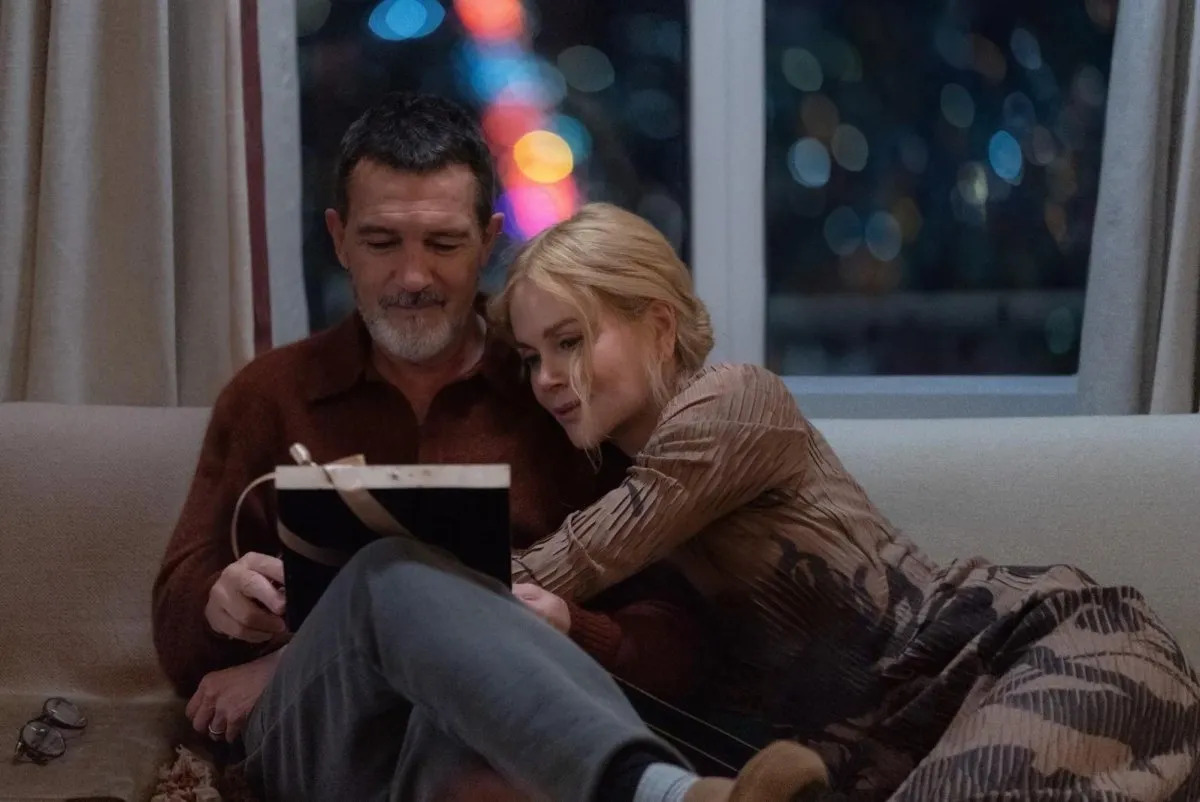Timeless Icon: Nicole Kidman

As Nicole Kidman collects accolades for her latest film Babygirl, she continues to shatter stereotypes about aging female stars, solidifying her place as one of Hollywood’s most formidable talents.
Nicole Kidman is a name that sparks a mix of admiration and intrigue. With a remarkable 42-year career that began in 1983 at the age of 16 with Bush Christmas in Australia, she has navigated the spotlight with a balance of grace and grit. Never fully the darling of public adoration nor ever overlooked, Kidman defies the “girl next door” archetype often celebrated in Hollywood.
Imagine crossing paths with her on your morning commute—you’d instinctively straighten up, struck by her commanding aura. Beneath her delicate, porcelain-like appearance lies a boldness that emanates from her piercing pale blue eyes, warning that she is anything but ordinary. Nicole Kidman embodies a quiet yet electrifying power, unafraid to break boundaries and leave a lasting impression.
When I say “never fully the darling of public adoration,” I don’t mean that Nicole Kidman isn’t loved or that she lacks a loyal fan base. Those who admire her do so with a kind of reverence—not with open arms but with an understanding that respects the boundaries she sets and the individuality she fiercely maintains, defying conventional norms. Perhaps it’s this unapologetic independence that has drawn sharp criticism over the years, often hitting below the belt. From her aesthetic choices to her role selections, Kidman has faced scrutiny that few others endure. Case in point: while most actresses’ filmographies dominate online searches, the most Googled question about Kidman is still, “How old is she?” (For the curious, she was born on June 20, 1967.)
This obsession with age reflects a broader challenge faced by older female stars worldwide. Goldie Hawn’s character Elise Elliot in the 1996 classic The First Wives Club humorously encapsulates this struggle, summing up the stages of Hollywood women: “The hot babe, the district attorney, and ‘Miss Daisy’s chauffeur.’” For decades, this sentiment rang true. Fortunately, the tide is turning. In recent years, iconic actresses like Demi Moore, Julianne Moore, and Tilda Swinton have boldly dismantled these ageist perceptions, proving that their brilliance only deepens with time. Nicole Kidman is undeniably among these trailblazers, challenging stereotypes with every role and cementing her place as a timeless icon who refuses to be confined by outdated narratives.
A natural-born redheaded Australian, Nicole Kidman first captured attention in the 1989 thriller Dead Calm, where she found herself stranded on a yacht alongside Sam Neill and Billy Zane. However, it was her performance in Days of Thunder (1990), opposite her future husband Tom Cruise, that propelled her into the limelight. That same year, at just 22, she married Cruise. The pair reunited onscreen for Far and Away in 1992, but Kidman never let the “Mrs. Cruise” label define her career. By 1995, she had firmly established herself as a leading actress, winning the Golden Globe for Best Actress in a Musical or Comedy for her role in Gus Van Sant’s acclaimed black comedy To Die For.
One of Kidman’s most iconic performances came in Stanley Kubrick’s swan song, Eyes Wide Shut, a film that famously took two years to complete. Reflecting on the experience in a 2022 BBC interview, Kidman declared, “I wouldn’t have cared if I had shot that movie for five years… I was with the greatest director in the world.” The film, etched in cinematic history, remains a testament to her commitment to challenging and provocative roles.
Her marriage to Cruise ended in 2001, a transformative year for Kidman both personally and professionally. She dazzled audiences with her fiery performance in Baz Luhrmann’s Moulin Rouge! shedding her “ice queen” persona and earning her second Golden Globe and her first Oscar nomination. The following year, she took home the Academy Award for Best Actress for her transformative portrayal of Virginia Woolf in The Hours. Not only did she fearlessly alter her appearance for the role, but she also made history as the first Australian actress to win an Oscar—a milestone that solidified her place among Hollywood’s elite.
In the 2000s, Nicole Kidman solidified her status as a powerhouse in Hollywood, taking on bold and diverse roles while amassing critical acclaim. From Lars von Trier’s experimental Dogville to Alejandro Amenábar’s haunting The Others and Anthony Minghella’s epic Cold Mountain, she continued to push artistic boundaries. Her fearless choices extended to the controversial Birth, the Diane Arbus biopic Fur, and the fantasy adventure The Golden Compass, which became one of the highest-grossing films worldwide at the time.
Kidman’s creative pursuits extended beyond acting. In 2010, she co-founded Blossom Films with Australian filmmaker Per Saari. Their first production, Rabbit Hole—based on David Lindsay-Abaire’s play about a grieving mother—earned widespread acclaim and multiple award nominations, including Oscars and Golden Globes. Blossom Films also played a pivotal role in the rise of prestige television, producing critically acclaimed series like Big Little Lies and The Undoing, which earned Kidman a Primetime Emmy Award in 2017.
Speaking about Blossom Films’ mission, Kidman once explained, “I love filmmakers with a strong vision. So much of what’s happening in this business is either atrophying, homogenizing, or fading away. I don’t like that.”

In 2017, Kidman made a bold pledge to address gender inequality in the film industry, vowing to work with a female director every 18 months. “If you have even a little bit of power as a woman in this industry, use it. If you can greenlight something or choose a director, say, ‘I want a woman to do this,’” she stated. This commitment to advocacy may stem from her roots.
Kidman’s late mother, Janelle Ann Kidman, was a prominent member of Australia’s Women’s Electoral Lobby, founded during the rise of second-wave feminism. Reflecting on her upbringing at a 2013 event, Kidman said, “I was raised by a feminist mother who told us to use the ‘F’ word without fear. I say it without fear… She planted the seeds in me at a very early age to challenge the fact that women are treated very differently from men.”
Nicole Kidman has faced her share of criticism for frequently portraying elegant, affluent women who fit conventional beauty standards. But despite these remarks—and accusations of playing it safe—Kidman has stayed true to her mission of amplifying female representation in the entertainment industry. By November 2024, she had collaborated with 15 female directors over seven years, a remarkable feat considering that in 2016, only 4% of the year’s top-grossing films were directed by women. (That number, thankfully, has risen to 14% by 2024).
Far from resting on her laurels, the “reserved and distant” Kidman has shattered two enduring Hollywood stereotypes: that actresses risk their star power by working in television and that older actresses inevitably fade from the spotlight. Since 2018, she has appeared in 10 films—including The Prom and Being the Ricardos—and eight television series, some of which she also produced. Her work has drawn both acclaim and scrutiny.
In a piece for The New York Times, journalist Jennifer Weiner addressed criticisms that Kidman repeatedly portrays “rich moms on the verge of a nervous breakdown,” countering with, “Guaranteed? Maybe. Too commercial? Whatever you say. Or maybe Ms. Kidman has identified an audience that has long been ignored or underestimated and is cleverly giving them what they want—while at the same time giving other women high-profile jobs or the opportunity to break into the industry. Isn’t that about as respectable as making superhero movies for young men?”
Recently, Kidman made waves with Babygirl, a provocative drama written and directed by Dutch filmmaker Halina Reijn, in which she stars alongside Antonio Banderas and Harris Dickinson. (Although the movie garnered both positive and negative reviews, its timing coinciding with Demi Moore’s The Substance feels like a subtle twist of fate, in my view.)
The film, noted for its steamy scenes and daring storyline, has polarized critics but earned Kidman high praise, including Best Actress wins at the Venice Film Festival and Palm Springs International Film Festival.

Her portrayal of a tech CEO entangled in a risky affair has sparked talk of a sixth Oscar nomination. For Kidman, pushing boundaries is nothing new. “I’m a character actor. I’m trained as a character actor. That’s what I want to do,” she recently said. “I believe you have to change the way you look, the way you move, the way you talk. I’m not very good at playing myself, so what really gives me the greatest satisfaction is to become something else.”

With a career defined by bold choices and a determination to lift others as she climbs, Kidman continues to prove she’s more than a star—she’s a force reshaping Hollywood’s narrative.
After The Substance: Films To Watch That Broke the Mold




